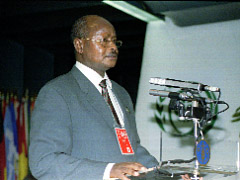


UGANDA - OUGANDA | ||
His Excellency Yoweri Kaguta Museveni, President of the Republic of Uganda | ||

Uganda is one of the nine African countries that either feeds itself or has money for import. Uganda, using only 5 million acres of its 40 million acres of good arable land, could produce 10 million metric tons of maize a year. This is enough to feed 50 million people for one year (if each one eats half a kilogramme per day). If we use fertilizers, this figure will be multiplied by a factor of four. We could, therefore, feed 200 million people using 5 000 000 acres of Uganda that could give us 40 million metric tonnes. Even in the worst days of Idi Amin, Uganda could always feed herself. Depending on rain alone, we are able to produce two crops in a year. If we irrigate, we can produce three or four crops in a year, depending what crop we are growing. Uganda alone could feed a large part of the regional population of Central and Eastern Africa. Therefore, the impediments to food security are not, mainly, because of nature, (for example, drought). The impediments have, in the past decades, been due to: · Colonialism and post-independence African dictatorship stifling people's freedom and causing conflicts; · Poor infrastructure; · Wrong policies that are not market-oriented and do not, therefore, sustain the interest of the farmers; · Not utilising research in seed improvement; · Poor farming techniques (no contour-farming, poor water conservation techniques and others); and · Land fragmentation. In the case of Uganda we have, through protracted revolutionary struggles, overthrown dictatorship and we are in the process of quelling residual counter-revolutionary violence. The people of Uganda are free at last. They can only be governed by their consent. We are building roads and have got a road development master-plan that will see the bitumenizing of 8 130 kms of roads in the next ten years. We have expunged the dictatorship by the regimes in the economy, a twin sister of the dictatorship in politics. The Ugandan producer is, at last free from the bureaucratic straightjacket. The Ugandan exporter now owns the foreign exchange that is earned from the items he exports (not the Central Bank of Uganda); the farmers can sell to whomsoever they like unless they have a prior contract with the processors; the Constitution of Uganda guarantees ownership of land in perpetuity, except for the public interest projects like airports and others. This liberalization, however, has got one pitfall: cyclic over-production and under-production with the attendant fluctuation of prices to the farmer. This is why some countries have been forced into subsidies. This is a long-term problem for sustained food security: When food-stocks are low, the prices are high. This attracts many Ugandan farmers to move into producing a particular food crop resulting in over-supply and the prices plummet. We must get a solution for this. On the side of research and good farming practices, although we are constrained by funds, we are moving slowly but surely. It is a matter of time. Since the world has got an increasingly difficult problem of food, I would like to inform you that Uganda and our part of Africa can play an important role in providing a solution. | ||
|
|
|
|

 |